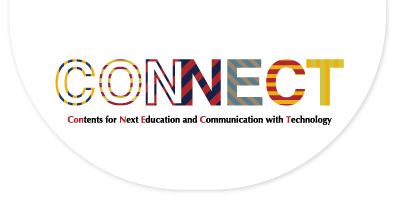TopicsREPORT OF PREVIOUS EVENT
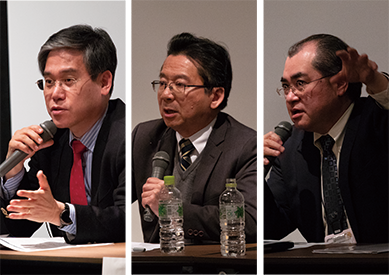
International Symposium
Envisioning Blended Next-Generation Higher Education: Asian Top Universities' Cutting-Edge ICT-Enhanced Teaching and Learning
Published online: November 6, 2020
Published online: June 6, 2019 (Original article)
November 6, 2020 (English article)
On March 2, 2018, the 93rd international symposium, "Envisioning Blended Next-Generation Higher Education: Asian Top Universities' Cutting-Edge ICT-Enhanced Teaching and Learning", was held at the Inamori Hall at Shirankaikan, Kyoto University. This event invited, as keynote and special lecturers, leaders and administrators playing a leading role in cutting-edge approaches at leading Asian universities. (Organizer: Center for the Promotion of Excellence in Higher Education)
Symposium Outline
In recent years, academic, industrial, and governmental stakeholders have been faced with urgent and critical issues arising from the rapid changes in industry structure and labor markets. Such issues include the promotion of lifelong learning and recurrent education, as well as the strategic use of ICT for new ways of teaching and learning. At the same time, flipped classroom and blended learning, utilizing MOOCs,* SPOCs,* OpenCourseWare (OCW),* and other online educational resources and learning environments, have become increasingly popular in Japan and abroad. Moreover, active efforts have been made to develop new systems for obtaining credits, academic degrees, and professional certificates, using MOOCs and other online educational systems.
With these circumstances in mind the symposium explored how to effectively and efficiently assist diverse students in their diverse ways of learning by utilizing ICT and innovative educational methods and environments. Under the theme the potential of blended next-generation higher education, the symposium introduced the participants to cutting-edge approaches taken at some of the top Asian universities, and the participants held lively discussions.
* For more details about MOOCs offered by Kyoto University, click here.
* SPOC: A generic term used to refer to a lecture, educational material, and learning environment available online and offered by a college principally for self-learning students. Click here to view detailed information about Kyoto University's SPOC system, KoALA.
* For more details about the OCW offered by Kyoto University, click here.
Symposium Program
Wednesday, March 2, 2018 at Inamori Hall, Shirankaikan, Kyoto University
13:30~ Opening Remarks
Hajime Kita (Director and Professor, Institute for Information Management and Communication, Kyoto University, Institute for Liberal Arts and Sciences, Kyoto University)
13:35~ Lecture "MOOC and SPOC at Kyoto University: Current Status and Prospect"
Hiroyuki Sakai (Associate Professor, Center for the Promotion of Excellence in Higher Education, Kyoto University)
13:50~ Lecture "Promoting ICT-Enhanced Education at Kyoto University: Through Making Educational Practice Visible and Sharable"
Mana Taguchi (Associate Professor, Center for the Promotion of Excellence in Higher Education, Kyoto University)
14:05~ Special Lecture "Envisioning ICT-Enhanced Higher Education 2025"
Toru Iiyoshi (Director and Professor, Center for the Promotion of Excellence in Higher Education, Kyoto University)
14:25~ Special Lecture (Video Lecture) "Promoting MOOC and Blended Teaching: Institutional and Personal Experiences"
Xiaoming Li (Head of MOOC initiatives and Professor, Peking University; Director, Institute of Network Computing and Information Systems)
14:40〜 Break
14:55〜
Keynote Lecture "Technology-Enriched Learning at HKU"
Ricky Yu-Kwong Kwok (Associate Vice-President (Teaching and Learning) and Professor, University of Hong Kong)
Keynote Lecture "Blended Learning at Seoul National University"
Cheolil Lim (Professor, Department of Education, Seoul National University; President, Korean Society for Educational Technology)
Keynote Lecture "Challenges and Opportunities beyond MOOCs"
Ting Chuen Pong (Senior Advisor to the EVPP (Teaching Innovation & E-learning); Director and Professor, Center for Engineering Education, Hong Kong University of Science and Technology)
16:10〜 Break
16:25〜 Panel Discussion
Moderator: Kayo Matsushita (Professor, Center for the Promotion of Excellence in Higher Education, Kyoto University)
Debater: Hajime Kita
Panelists: Xiaoming Li, Ricky Yu-Kwong Kwok, Cheolil Lim, Ting Chuen Pong, IIYOSHI Toru
17:45 Closing
※ Professor Kwok's keynote lecture was cancelled for various reasons.
Symposium Details
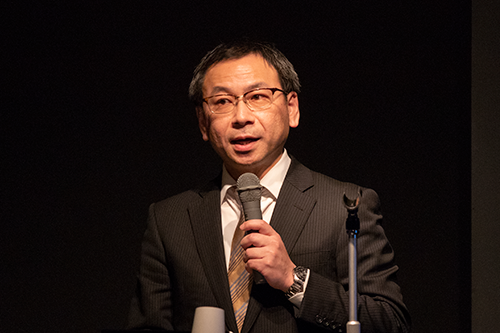
Associate Professor Hiroyuki Sakai (Click here to watch video)
Associate Professor Sakai reported on the current approaches taken at Kyoto University and their future prospects. He described individual approaches, such as OCW, MOOC, LMS,* and MOST* (online FD support system), and stated that each approach was connected in a versatile manner for effective educational improvements. In a report on MOOCs, Associate Professor Sakai described courses currently offered and the ripple effects observed after course publication. As an actual example of ripple effects, he mentioned the invitation of foreign students to Kyoto University through MOOCs and the use of MOOCs in educational practices, such as the flipped classroom. Moreover, in a report on SPOCs, he outlined Kyoto University's SPOC system, KoALA, and described how the service was provided. Additionally, as future prospects and challenges, he mentioned development of well-designed courses and coordination with other educational support tools and systems used at Kyoto University.
* Click here to know about PandA, an LMS at Kyoto University.
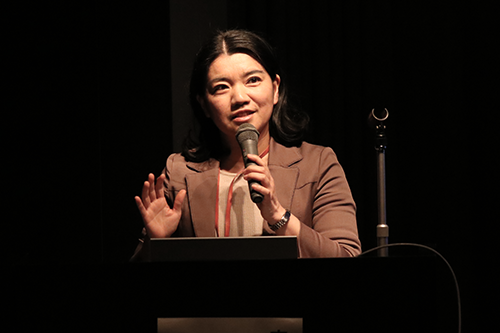
Associate Professor Mana Taguchi (Click here to watch video)
In her lecture, Associate Professor Taguchi described teaching improvement efforts made at Kyoto University utilizing ICT. She said that the Center for the Promotion of Excellence in Higher Education had continuously taken various approaches through trial and error, such as open classes and reviews thereof, provision of the online FD support system MOST, and construction of CONNECT (this website) with the aim of making educational practices visible and sharable. Then, she provided a tangible description of a flipped classroom and interactive teaching in the form of a major lecture to demonstrate recent ICT-enhanced educational practices at Kyoto University.
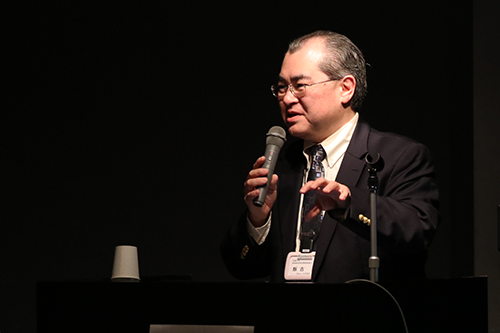
Professor Toru Iiyoshi (Click here to watch video)
In his lecture, Professor Iiyoshi envisioned higher education for 2025. He predicted an "era of Ps" for higher education in the 2020s, represented by keywords such as personalization, preference (personal preferences), prediction (various predictions based on big data and data analytics), and proactive. As examples, he mentioned Global Freshman Academy, a first-year educational program using MOOCs offered at Arizona State University, and micro-credential, which are like mini-degrees or certifications in a specific topic area. He continued by predicting that in 2025, higher education will probably see modularized and low-cost subjects and courses responding to learners' demand, reduced spatial and temporal restrictions, diversification of available certificates of completion, and personalization based on a wealth of data.
* If you are interested in a concrete example of micro-credentials, click here to read detailed information about MicroMasters, a micro-credential using MOOC.
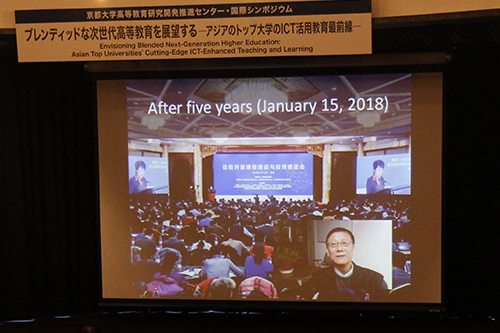
Professor Li (Click here to watch video)
The lecture by Professor Li began with his achievements as the head of the MOOC taskforce at Peking University, offering over 100 courses, including his own MOOC courses. He then narrated Peking University's efforts to promote blended education and approaches taken to construct and provide a platform that instructors at other universities could use. Professor Li said that for wider use of blended education, it is necessary to provide more MOOCs. To this end, he said, social recognition of MOOCs should be enhanced, and open public education should be promoted.
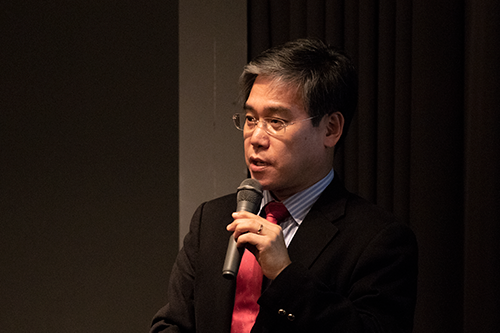
Professor Lim (Click here to watch video
Professor Lim reported on Seoul National University's ICT-enhanced teaching and learning and blended learning approach. More specifically, he described the development and promotion of MOOCs and LMS (eTL); flipped classroom implementation, support, and assessment; and development of an on-campus online learning environment (SNUON: SNU Open educatioN). As priority goals for future blended learning at Seoul National University, Professor Lim mentioned: (1) Development of blended educational curricula tailored to individual students and based on learning analytics, (2) Encouragement of student participation, (3) Fostering of instructors' teaching skills by providing instructor training programs and forming instructor communities, (4) Enhancement of flipped classrooms using educational materials and the MOOCs of other higher-education institutions, and (5) Technical and organizational support from IR(institutional research) and consultation designed for students and instructors.
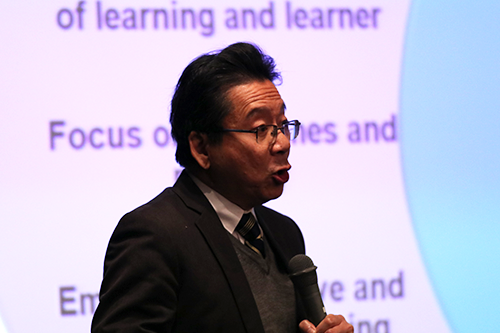
Professor Pong (Click here to watch video)
Professor Pong first outlined recent changes observed in higher education on a global scale, and reported on MOOC and blended learning approaches taken at the Hong Kong University of Science and Technology. The examples he presented included: (1) Use of learning analytics and bulletin boards with the MOOC "Introduction to Computing with Java," (2) Flipped classrooms using MOOCs, (3) Blended experiential learning, and (4) Virtual Exchange, a study abroad program made possible by university collaborations using MOOCs.
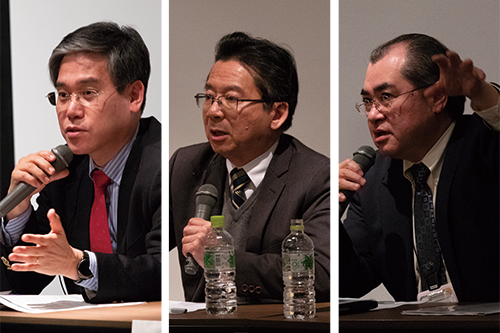
Panelists (panel discussion videos: debate, summary of discussion points, panel discussion)
In the following panel discussion regarding the information presented by the keynote and special lecturers, the panelists discussed trends in higher education in Japan and abroad, as well as approaches taken at universities. In response to questions raised by the audience, the panelists also discussed how they should view the sustainability of ICT-enhanced teaching and learning against the backdrop of university budget cutbacks and desirable forms of instructor training (professional development), as well as what methods should be used for assessment in the blended education approach.
After the symposium, participants commented: "Topics focused on relations and differences between MOOC-based education and on-campus education were very interesting"; "Perspectives regarding today's trends and actual curriculum development were thought-provoking"; and "The symposium allowed me to consider prospects of and challenges facing the parties creating and running MOOC-based education, and it was informative in that it presented prospects for society 10 years from now".
